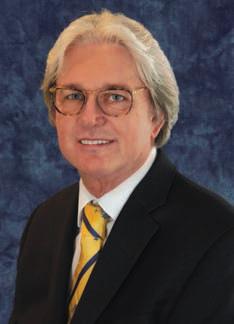
5 minute read
Fantini’s Finance

Strength in Stability
Advertisement
The U.S. regional gaming operators are booming because of basic strategy and strong leadership
By Frank Fantini
We’re mostly through quarterly earnings season as this is being written, and we don’t have a much clearer picture of the road ahead than we had before it started.
The reports and forecasts by gaming companies remain the same: business is booming, the recovery from Covid continues, expenses are under control and consumers are spending freely, though we can’t say for how long.
The reaction from investors, however, has been more one-sided: They have been selling stocks of all stripes for fear that inflation will weaken consumer spending and end in recession.
That leaves the question of what investors should do now that stocks have sold off significantly.
As usual, you can find the full range of opinions from a deepening bear market to those who think we are in a correction and are looking for signs of a market bottom, to bulls who see stocks at bargain prices.
Obviously, investors have to be aware of overall economic forces and current stock price valuations.
But for long-term investors, it is the fundamentals that matter. In that case, almost all of the domestic U.S. casino companies are strong. And it isn’t just that business trends are strong and may strengthen further as the country recovers from Covid lockdowns and restraints.
It is that the companies are well-managed and have prudent and proven growth strategies.
During the first quarter earnings season, CEO after CEO of regional casino companies cited strengthening balance sheets and incremental growth plans.
Red Rock Resorts, for example, has locked in 70 percent of the cost to develop its Durango Boulevard casino in Las Vegas, where no other casino-entitled land exists in a five-mile radius. The company discussed benefiting from rapidly growing Las Vegas, and is sweetening its growth plan with a low-cost shift toward serving more affluent players. In addition, Red Rock is studying the future of three casinos still shuttered by Covid. After having switched 92 percent to 94 percent of customers from those properties to sister casinos, the company now has valuable real estate it can monetize in many ways.
Golden Entertainment likewise is making targeted investments in a low-risk strategy of growing at existing properties and taking advantage of southern Nevada population growth, such as ramping up the concert calendar in events-driven Laughlin.
Caesars is completing renovation projects throughout its network, and like Golden, is achieving above-targeted returns on investment.
Churchill Downs is turning its home state of Kentucky into a historical horse racing empire at reasonable costs.
These companies are growing free cash flow and returning much of it to shareholders through stock buybacks and, in cases such as Boyd, Red Rock and Churchill Downs, cash dividends.
These all are simple stories of blocking and tackling and prudence.
But there’s another quality that the U.S. regional casino companies possess—leaders who have proven records of success and, in several cases, are major shareholders with interests thus aligned with all shareholders.
Consider Boyd Gaming. Executive Chairman Bill Boyd has been there all of his life. CEO Keith Smith has been with the company since 1990. He became CEO in 2008, the same year CFO Josh Hirsberg joined the company.
At Caesars, for Executive Chairman Gary Carano and COO Anthony Carano, predecessor company Eldorado Resorts was the family business. CEO Tom Reeg joined in 2007.
Red Rock CEO Frank Fertitta and brother Lorenzo also joined the family business through predecessor Station Casinos.
Monarch Casino CEO John Farahi and his brothers founded the company.
Blake Sartini is founder of Golden Entertainment. President and CFO Charles Protell has been there since 2016. COO Steve Arcana has been there since 2003. Blake Sartini II is EVP of operations.
Churchill Downs doesn’t have the same family ties, but it does have same continuity of leadership. CEO Bill Carstanjen has been on the job since 2014 and joined the company in 2003. COO Bill Mudd has been there since 2007.
In each of these cases, the companies have been successful investments, some wildly so.
Of course, continuity is not an end in itself. And American enterprise is filled with companies where the founders or legendary leaders lost their shine.
But that isn’t the case with these companies in my observation. When Bill Carstanjen took Churchill Downs out of the burgeoning online betting industry because it isn’t proving profitable, he made a tough decision, and given the success of his growth strategies in historical horse racing and in further building the Kentucky Derby franchise, it should prove to be a value-building decision for investors.
Likewise, the Fertittas’ strategy of pursuing high-value customers in ever more affluent Las Vegas and taking a hard-nosed examination of the future of its shuttered properties are the kinds of decisions made by executives at the top of their game.
In summary, there are a lot of good numbers that support the strength and continued growth of America’s regional casino companies. And one of their greatest for investors should be the high quality and proven experience of the executives running them.






